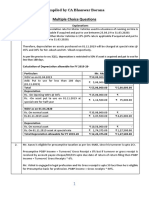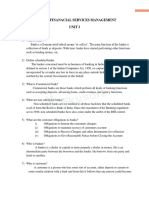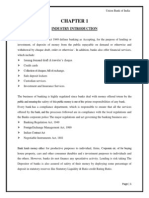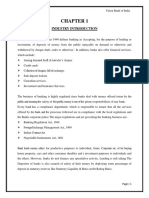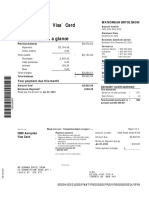BLP Assignment
BLP Assignment
Uploaded by
Sekar MuruganCopyright:
Available Formats
BLP Assignment
BLP Assignment
Uploaded by
Sekar MuruganOriginal Description:
Copyright
Available Formats
Share this document
Did you find this document useful?
Is this content inappropriate?
Copyright:
Available Formats
BLP Assignment
BLP Assignment
Uploaded by
Sekar MuruganCopyright:
Available Formats
BANKING LAW AND PRACTICE
Assignment Topics
UNIT I
1. Define the terms banker and customer and bring out the relationship that exists
between them.
2. Is a banker obliged to maintain the secrecy of his customers account? Under what
circumstances can he disclose the account and what precautions should he take in
such cases?
3. The relationship between a banker and a customer is primarily that of a debtor and
creditor. Discuss.
4. State and explain the bankers obligation to honour the cheques. What risks does he
have to face in the case of wrongful dishonour of a cheque?
5. Describe the different types of banks and functions performed by them.
6. With the development of banking institutions, various systems of banking have come
into existence. Discuss the banking systems.
7. A comparison between unit banking and branch banking is essentially a comparison
between small-scale and large-scale operation. Discuss.
UNIT II
1. State the salient features of the Banking Regulation Act.
2. Outline the provisions of the Banking Regulation Act regarding the licensing and
business of banking company.
3. Narrate the provisions of the Banking Regulation Act regarding:
i)
Opening of new branches
ii)
Capital requirements
iii)
Inspection of banking companies
4. Elaborate the main functions of RBI.
5. Points out the instruments are available to the RBI for control of credit.
6. Explain the role of commercial banks in the economic development of a country.
7. Discuss the innovative lending schemes introduced recently by commercial banks in
India.
UNIT III
1.
2.
3.
4.
5.
Draw the fixed deposit and recurring deposit and discuss its schemes.
Distinguish between a Current Account and Savings Bank Account.
Describe the formalities which a banker has to observe before opening a new account.
Give a specimen of a cheque and discuss its features.
Distinguish between a cheque and draft and bring out clearly the risks of honouring a
post-dated cheque.
6. All cheques are bills but all bills are not cheques. Comment.
7. Discuss the legal position of a pass book.
8. Define negotiable instruments and discuss its features and types.
9. Describe the different kinds of crossing with examples and its significance.
10. An endorsement is to the signing of a document that allows for the legal transfer of a
negotiable from one party to another. Comment this statement and explain its kinds
with suitable examples.
11. A cheque containing a conditional endorsement is presented to you for payment. Will
you honour it without fulfilling that condition?
12. Distinguish between Forged endorsement and Irregular endorsement. How will
you ascertain whether an endorsement is regular or not.
UNIT IV
1. Elaborate the principles that guide a banker in granting loans and advances.
2. Outline the precautions should a banker take while making unsecured advances.
3. Pledge as, the bailment of goods as security for payment of a debt or performance of
a promise comment and explain rights and duties of a banker as a pledgee.
4. Discuss fully the various kinds of mortgage.
5. Analyse the factors that contribute to NPA.
6. Classify Early Warning Signals and explain them.
UNIT V
1.
2.
3.
4.
5.
6.
7.
8.
Discuss the features of E-banking and bring out its merits and constraints.
List down the popular E-banking channels and facets of E-banking.
Define e-cheque and bring out its features and advantages.
Distinguish between conventional (traditional) banking and E-banking and explain the
various models for E-banking.
Describe Real-Time Gross Settlement (RTGS) and its advantages.
Analyse the various issues involved in E-banking and suggest measures to overcome
them.
Give a brief account of the banking sector reform in India.
Evaluate the role of NABARD in the field of agricultural finance.
You might also like
- CAIIB 2023 - BRBL - Objective NotesDocument223 pagesCAIIB 2023 - BRBL - Objective NotesSaurabh SiddhantNo ratings yet
- 1.1 R - Old Edition - Dra-HandbookDocument97 pages1.1 R - Old Edition - Dra-HandbookRAJALAKSHMI HARIHARAN100% (1)
- Tamil 6-12 Notes by ArivukkadalDocument264 pagesTamil 6-12 Notes by Arivukkadaldorathi88% (57)
- Project Report On Indian Banking SystemDocument23 pagesProject Report On Indian Banking Systemsaif aliNo ratings yet
- Multiple Choice Questions: Compiled by CA Bhanwar BoranaDocument45 pagesMultiple Choice Questions: Compiled by CA Bhanwar BoranaGirishNo ratings yet
- Probable Ques3 &4Document3 pagesProbable Ques3 &4avikumar001No ratings yet
- Questions - Banking LawDocument5 pagesQuestions - Banking LawNitya DaryananiNo ratings yet
- Question PaperDocument6 pagesQuestion PaperAminul Haque RusselNo ratings yet
- Banking Law Questions - 024016Document4 pagesBanking Law Questions - 024016Nanditha SwamyNo ratings yet
- Questions - Banking LawDocument5 pagesQuestions - Banking LawVishal NaregalNo ratings yet
- BL Banking Law QuestionsDocument10 pagesBL Banking Law Questionskowc kousalyaNo ratings yet
- FSBI Important QuestioinsDocument6 pagesFSBI Important QuestioinsNagarjuna SunkaraNo ratings yet
- Banking Law Important QuestionDocument2 pagesBanking Law Important QuestionThrishul MaheshNo ratings yet
- Principles & Practice of Banking and Insurance Q&ADocument3 pagesPrinciples & Practice of Banking and Insurance Q&Arupeshdahake50% (2)
- Banking Law and Practice-1Document5 pagesBanking Law and Practice-1udaymasssssNo ratings yet
- Banking Law Long QuestionsDocument4 pagesBanking Law Long QuestionsDEEPAKNo ratings yet
- Banking lawDocument4 pagesBanking lawTapan MandalNo ratings yet
- Banking Important Exam Question and TermsDocument3 pagesBanking Important Exam Question and TermsAnkit JajalNo ratings yet
- Banking Law and Practice PDFDocument658 pagesBanking Law and Practice PDFshahidNo ratings yet
- BRO IMP QPDocument3 pagesBRO IMP QPshashank reddyNo ratings yet
- Banking Law KSLU Notes Grand FinalDocument83 pagesBanking Law KSLU Notes Grand FinalSherminasNo ratings yet
- Banking Finanacial Services Management Unit I: Two Mark QuestionsDocument21 pagesBanking Finanacial Services Management Unit I: Two Mark QuestionsIndhuja MNo ratings yet
- Credit Operations QuestionDocument2 pagesCredit Operations QuestionSumon AhmedNo ratings yet
- 17Uco6Mc04 Modern Banking Pratices Question Bank Unit - 1: Introduction To BankingDocument4 pages17Uco6Mc04 Modern Banking Pratices Question Bank Unit - 1: Introduction To BankingSimon JosephNo ratings yet
- Bank, CPC and BnssDocument18 pagesBank, CPC and BnssshakthiNo ratings yet
- LAW OF BANKING and Negotiable InstrumentsDocument59 pagesLAW OF BANKING and Negotiable Instrumentspawanfrnd48No ratings yet
- Banking Law 100marks March April 2023 (Dec 2022)Document7 pagesBanking Law 100marks March April 2023 (Dec 2022)Veena T NNo ratings yet
- LRM QDocument2 pagesLRM QJibon JainNo ratings yet
- Final QBDocument2 pagesFinal QBsreedatthapuvvalaNo ratings yet
- Banking and Financial ServicesDocument3 pagesBanking and Financial Serviceskausarbagwan234No ratings yet
- FedaiDocument3 pagesFedaiSourav AdiNo ratings yet
- BANKINGDocument42 pagesBANKINGMEDICAL FEILDNo ratings yet
- 30800question Bank For Banking LawDocument7 pages30800question Bank For Banking LawShivamNo ratings yet
- Ba7026 Banking Financial Services ManagementDocument22 pagesBa7026 Banking Financial Services Managementnandhini chokkanathanNo ratings yet
- BANKING AND INSURANCE LAW Sullanus and PypDocument4 pagesBANKING AND INSURANCE LAW Sullanus and PypHarsha RaoNo ratings yet
- 236_8 BANKING THEORY LAW AND PRACTICE _ SEM-3.docDocument3 pages236_8 BANKING THEORY LAW AND PRACTICE _ SEM-3.docM.S. ThilagaNo ratings yet
- 3rd Sem B, L&o 1.docx 2Document85 pages3rd Sem B, L&o 1.docx 2shree harsha cNo ratings yet
- Banking Theory Law and PracticeDocument29 pagesBanking Theory Law and Practicereshma100% (2)
- 5th Sem BR&ODocument111 pages5th Sem BR&Oshree harsha cNo ratings yet
- BA7026 Banking Financial Services ManagementDocument120 pagesBA7026 Banking Financial Services ManagementchandrasekharNo ratings yet
- A. It Is Complex Closely Connected Network of Financial Institutions, Agents, MarketsDocument9 pagesA. It Is Complex Closely Connected Network of Financial Institutions, Agents, Marketsravindrababu20093465No ratings yet
- Stryker Corporation: Capital BudgetingDocument4 pagesStryker Corporation: Capital BudgetingShakthi RaghaviNo ratings yet
- FINMA 3 Module 3Document28 pagesFINMA 3 Module 3Mark LightNo ratings yet
- Commercial BankingDocument17 pagesCommercial BankingshanujssNo ratings yet
- Banker NotesDocument134 pagesBanker NotesEdward MokweriNo ratings yet
- Banking & Its Operation: Finance SpecialisationDocument4 pagesBanking & Its Operation: Finance SpecialisationManojkumar HegdeNo ratings yet
- Union Bank of IndiaDocument58 pagesUnion Bank of Indiadivyesh_variaNo ratings yet
- Banking LawDocument6 pagesBanking LawSanjai KumarNo ratings yet
- Banking Laws Notesm - Com 4th SemDocument343 pagesBanking Laws Notesm - Com 4th SemYashaswini BohraNo ratings yet
- MFI IndexDocument2 pagesMFI Indexaurisha008No ratings yet
- Law of Banking and Negotiable InstrumentsDocument37 pagesLaw of Banking and Negotiable InstrumentssraonethiNo ratings yet
- Union Bank of IndiaDocument58 pagesUnion Bank of IndiaRakesh Prabhakar ShrivastavaNo ratings yet
- Title: Analysis of Retail Loans of Bank of Baroda Vis A Vis CompetitorsDocument42 pagesTitle: Analysis of Retail Loans of Bank of Baroda Vis A Vis CompetitorsSmriti SinghNo ratings yet
- Jaiib Demo NotesDocument16 pagesJaiib Demo Notesaditya_bb_sharmaNo ratings yet
- Functions of BanksDocument10 pagesFunctions of Banksz5bp8jgb2kNo ratings yet
- TOPIC FOURDocument16 pagesTOPIC FOURMACHUKA MOSIOMA GEORGENo ratings yet
- Bba Hons Part-Iii Department of Accounting & Finance and Banking Banking and Insurance Theories Laws and Practice Part-ADocument2 pagesBba Hons Part-Iii Department of Accounting & Finance and Banking Banking and Insurance Theories Laws and Practice Part-AMeethila Noureen OpshoraNo ratings yet
- Business Law BBA: 206-B Bba 4 SEM Question Bank: Unit-1Document2 pagesBusiness Law BBA: 206-B Bba 4 SEM Question Bank: Unit-1monikaNo ratings yet
- QuestionsDocument8 pagesQuestionstattiblackblackNo ratings yet
- Ii B.com Banking Theory Law PracticeDocument22 pagesIi B.com Banking Theory Law PracticePraveen CoolNo ratings yet
- Banking Law PART - A (12 Marks)Document4 pagesBanking Law PART - A (12 Marks)PrakashNo ratings yet
- Commercial Banks QuesDocument3 pagesCommercial Banks QuesBabu BalaramanNo ratings yet
- Module 1Document3 pagesModule 1Jonah Apagu WabbaNo ratings yet
- Research Notes 1 PDFDocument18 pagesResearch Notes 1 PDFSekar MuruganNo ratings yet
- Chapter - I 1.A Introduction Oragansation ClimateDocument36 pagesChapter - I 1.A Introduction Oragansation ClimateSekar MuruganNo ratings yet
- Rathnavel Subramaniam College of Arts & Science Sports Club Basketball Fixtures - MenDocument2 pagesRathnavel Subramaniam College of Arts & Science Sports Club Basketball Fixtures - MenSekar MuruganNo ratings yet
- Helmet Awareness - QuestionnaireDocument2 pagesHelmet Awareness - QuestionnaireSekar Murugan100% (1)
- Green Marketing QuestionnaireDocument17 pagesGreen Marketing QuestionnaireSekar Murugan100% (1)
- LEAD International ConferenceDocument6 pagesLEAD International ConferenceSekar MuruganNo ratings yet
- Syllabus - Mis 2019Document3 pagesSyllabus - Mis 2019Sekar MuruganNo ratings yet
- Green Marketing Questionnaire PDFDocument17 pagesGreen Marketing Questionnaire PDFSekar MuruganNo ratings yet
- History of OrganisationDocument3 pagesHistory of OrganisationSekar MuruganNo ratings yet
- Research Methods For Management: Unit - IDocument14 pagesResearch Methods For Management: Unit - ISekar MuruganNo ratings yet
- PG Value Pricing moveJM2001 PDFDocument88 pagesPG Value Pricing moveJM2001 PDFSekar MuruganNo ratings yet
- Topic 1 - Introduction To Industrial PsychologyDocument8 pagesTopic 1 - Introduction To Industrial PsychologySekar Murugan50% (2)
- 13 ReferencesDocument7 pages13 ReferencesSekar MuruganNo ratings yet
- Coimbatore-641 046, Tamil NaduDocument4 pagesCoimbatore-641 046, Tamil NaduSekar MuruganNo ratings yet
- Y.L Somashekara Research Scholar DOS in Library & Information Science MGM MysoreDocument18 pagesY.L Somashekara Research Scholar DOS in Library & Information Science MGM MysoreSekar MuruganNo ratings yet
- INZ1015 - Work Visa Application FormDocument12 pagesINZ1015 - Work Visa Application FormStephanie AndersonNo ratings yet
- BRS NumericalDocument1 pageBRS NumericalAts Sheikh100% (1)
- Cswip 3.2.1 Enrollment Form (Initial)Document13 pagesCswip 3.2.1 Enrollment Form (Initial)Aris BulaongNo ratings yet
- Challan Sep Neha Zari ArtDocument2 pagesChallan Sep Neha Zari Artafroz khanNo ratings yet
- Banking Law Assigment UL18BB007Document9 pagesBanking Law Assigment UL18BB007Sanket SwaroopNo ratings yet
- Hassan ResumeDocument4 pagesHassan ResumeHassan RoshanNo ratings yet
- Final Askari Bank Report HamzaDocument41 pagesFinal Askari Bank Report HamzaSO HaNo ratings yet
- Lim Vs PeopleDocument10 pagesLim Vs PeopleAMNo ratings yet
- Cash Book: Cash Book Is A Book of Original Entry in WhichDocument10 pagesCash Book: Cash Book Is A Book of Original Entry in WhichCT SunilkumarNo ratings yet
- Chapter 2 15Document40 pagesChapter 2 15Tanmay YadavNo ratings yet
- CPA EXAM QsDocument29 pagesCPA EXAM QsbajujuNo ratings yet
- Signed Loan AgreementDocument9 pagesSigned Loan AgreementDOC27 PavanNo ratings yet
- Important Information For Request For Postponement or CancellationDocument2 pagesImportant Information For Request For Postponement or CancellationankitNo ratings yet
- Violeta Bahilidad Vs People of ThephilippinesDocument2 pagesVioleta Bahilidad Vs People of ThephilippinesThessaloe B. Fernandez100% (1)
- Online StatementDocument4 pagesOnline StatementNorman and AngieNo ratings yet
- I 1 ZCK 8 OKh 71 CC 7 CPDocument2 pagesI 1 ZCK 8 OKh 71 CC 7 CPAvinash SomannaNo ratings yet
- Investment - Audit Program - HandoutsDocument2 pagesInvestment - Audit Program - HandoutsRoquessa Michel R. IgnaligNo ratings yet
- Cebu International Finance Corporation v. CADocument2 pagesCebu International Finance Corporation v. CAAbbyElbambo0% (1)
- EDI Service Code Reference Table Format Updated FINAL021107 - PDFDocument100 pagesEDI Service Code Reference Table Format Updated FINAL021107 - PDFBib YenNo ratings yet
- What To Carry While Travelling To USADocument12 pagesWhat To Carry While Travelling To USAKrishna KothapalliNo ratings yet
- AnnexuresDocument47 pagesAnnexuresRajneesh JadhavNo ratings yet
- Very Easy Money TransferDocument17 pagesVery Easy Money TransferMuhammad UsmanNo ratings yet
- Role of Banking in International BusinessDocument15 pagesRole of Banking in International Businesstheaaj100% (2)
- 798B NEW ACHVendorPaymentAuthorizationAgreement1Document2 pages798B NEW ACHVendorPaymentAuthorizationAgreement1olagokeolabode8No ratings yet
- Form No. 3CB (See Rule 6G (1) (B) ) Audit Report Under Section 44AB of The Income-Tax Act, 1961, in The Case of of A Person Referred To in Clause (B) of Sub - Rule (1) of The Rule 6GDocument13 pagesForm No. 3CB (See Rule 6G (1) (B) ) Audit Report Under Section 44AB of The Income-Tax Act, 1961, in The Case of of A Person Referred To in Clause (B) of Sub - Rule (1) of The Rule 6GKhehracybercafe SahnewalNo ratings yet
- 08 Claim FormDocument4 pages08 Claim Formanurag1309No ratings yet
- RBC Service Fees and ChargesDocument8 pagesRBC Service Fees and Chargeslegolas55569No ratings yet
- Javellana vs. MirasolDocument6 pagesJavellana vs. MirasolMj BrionesNo ratings yet




